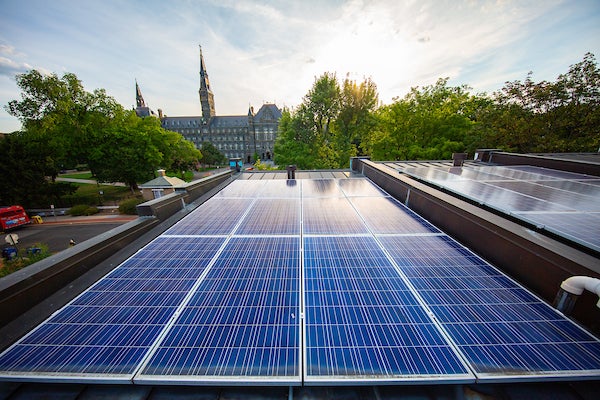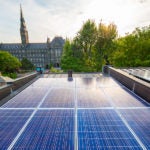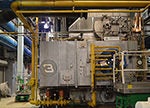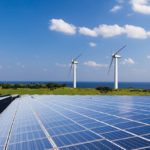Energy and Climate

Georgetown University is taking significant steps to advance sustainable energy within our campus operations. Since reaching our goal to cut the university’s greenhouse gas emission in half by the year 2020, we are looking to do even more to care for our common home.
In 2008, Georgetown’s President, John J. DeGioia, pledged to reduce the University’s Scope 1 and 2 greenhouse gas emissions by at least 50% from a base year of 2006 by the year 2020. In 2014, Georgetown reduced our carbon footprint by over 71% through a combination of energy efficiency in our facilities and procurement of renewable energy certificates (RECs) for 100% of our power, meeting our GHG goal six years ahead of target. But our work doesn’t stop there. Now, the University continues to actively explore and pursue opportunities to increase our leadership and impact on clean energy and climate, including strategies to further reduce our footprint through a combination of efficiency, conservation and investments in new renewable power.
Explore the links below to learn more about our sustainable energy and greenhouse gas reduction initiatives, and find out how you can get involved.
What We’re Doing

Energy Partnership – Early April of 2021, Georgetown joined forces with Georgetown Energy Partners providing utility services from ENGIE North America, a global leader in energy services and sustainability, as part of the University’s ongoing efforts to enhance sustainable practices on campus. Under this partnership, ENGIE is responsible for the enhancement, operation and upkeep of the systems that heat, cool and distribute power to the University’s Washington, DC, campuses. Georgetown retains ownership of its facilities and control over decisions related to capital improvement.

Renewable Energy – Renewable energy is an important part of our commitment to sustainability. In 2020, Georgetown entered into a power purchase that puts more renewable energy on the grid. This 15-year agreement allowed Georgetown to annually buy 100,000 megawatt-hours of electricity from 11 existing solar plants, providing two-thirds of the university’s electricity needs.Since 2013, Georgetown has purchased Renewable Energy Certificates for 100% of electricity, earning the EPA’s Green Power Partner of the Year Award. Through projects like the historic ICC solar array and the “Solar Street” initiative, we are demonstrating renewable technology on campus. As part of our ongoing energy sourcing, we continue to evaluate and pursue strategic opportunities to further increase our use of renewable energy.

Conservation and Efficiency – Through initiatives like our district heating and cooling plant and ongoing building energy retrofits, Georgetown is taking significant steps to cut our energy demand and use energy more efficiently.

Greenhouse Gas Inventory – GU has significantly reduced our GHG emissions even while increasing the number of buildings on campus and the number of students served.
Teaching, Research and Engagement

Commitment to Global Climate Effort – Georgetown has joined with a group of leading research universities in affirming our commitment to a broad-based global agreement on climate change and to doing our part to ensure the United States can meet its contribution.

Georgetown Climate Center – The nonpartisan Georgetown Climate Center seeks to advance effective climate, energy, and transportation policies in the United States— policies that reduce greenhouse gas emissions and help communities adapt to climate change.

Energy and Climate Policy Research Seminar – The energy and climate policy research seminar aims to enhance intellectual exchange among faculty and students by providing a forum to discuss research and policy topics related to the international and domestic dimensions of energy and climate change policy.

The Earth Commons – Learn even more about how GU faculty are engaging with topics of environment and sustainability.
Get Involved

For Students – Check out these Top 10 Ways to Save and Top 10 Sustainable Living Tips!

For Faculty and Staff – Explore our Top 10 Ways to Save Energy In the Office and participate in GU’s Campus Energy Conservation Program.
